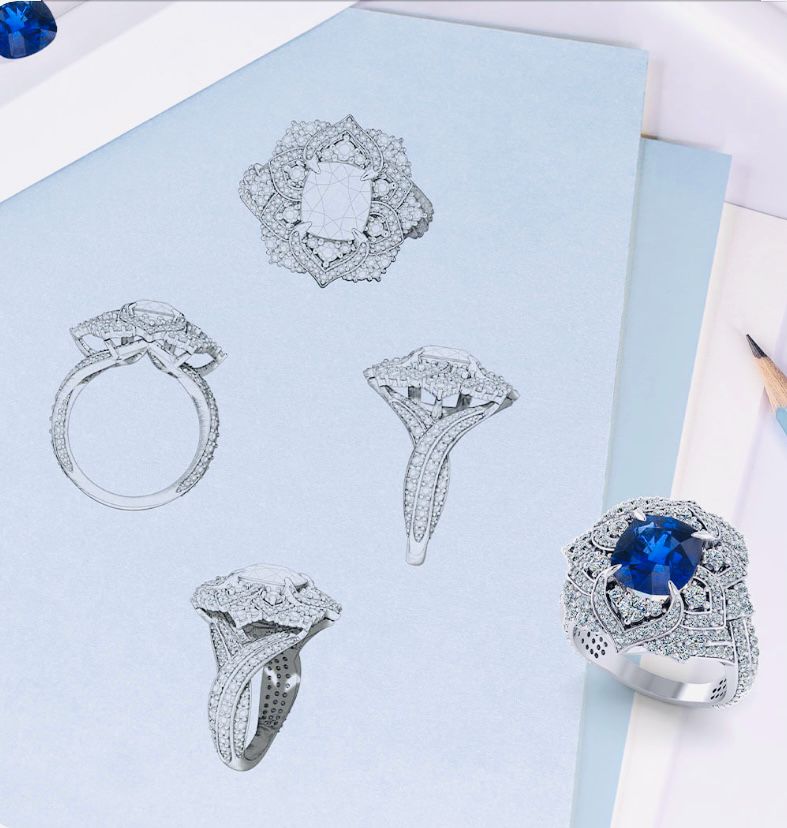Handmade, custom jewelry offers a unique and personalized touch that sets it apart from mass-produced alternatives. In today’s world where sustainability and ethical consumerism are gaining momentum, the environmental impact of our choices cannot be overlooked. This article delves into the environmental implications of opting for handmade, custom jewelry over mass produced options. By exploring the resource-intensive processes of mass production, the benefits of supporting artisanal craftsmanship, and the sustainability practices in handmade jewelry production, we aim to shed light on the importance of making informed and eco-conscious choices in the realm of jewelry consumption.
Introduction to Handmade, Custom Jewelry
When it comes to jewelry, there’s something special about pieces that are handmade and custom-made just for you. These unique creations reflect your individual style and personality, standing out from the mass-produced options that flood the market.
Defining Handmade, Custom Jewelry
Handmade, custom jewelry is crafted by skilled artisans who pour their heart and soul into every piece. These creations are tailored to your specific preferences, ensuring that each design is one-of-a-kind and made with love and attention to detail.
Environmental Concerns of Mass-Produced Jewelry
The glitz and glamour of mass-produced jewelry often come with a hidden cost to the environment. From resource depletion to pollution, the production processes of these pieces take a toll on our planet.
Resource Depletion and Pollution in Mass Production
Mass production of jewelry requires vast amounts of natural resources, leading to deforestation, water pollution, and habitat destruction. The energy-intensive manufacturing processes also contribute to air and water pollution, further exacerbating environmental issues.
Impact of Mining and Extraction Processes
The mining and extraction of precious metals and gemstones for mass-produced jewelry have far-reaching consequences, including ecosystem destruction, soil erosion, and displacement of indigenous communities. Additionally, the use of harmful chemicals in these processes poses serious health risks to workers and nearby communities.
Benefits of Choosing Handmade, Custom Jewelry
Opting for handmade, custom jewelry over mass-produced options can have a positive impact on both the environment and local communities. These unique creations offer more than just aesthetic appeal—they embody sustainability and support artisanal skills.
Reduced Carbon Footprint and Waste Generation
By choosing handmade, custom jewelry, you are reducing your carbon footprint and minimizing waste generation. Artisans often use sustainable practices and materials, making each piece environmentally friendly and ethically produced.
Promotion of Artisanal Skills and Local Economies
Supporting handmade, custom jewelry means investing in the talent and expertise of artisans who uphold traditional craftsmanship. By valuing their skills, you are helping to preserve cultural heritage and support local economies, fostering a more sustainable and equitable jewelry industry.
Sustainability Practices in Handmade Jewelry Production
Sustainability is at the core of handmade jewelry production, with artisans embracing practices that prioritize environmental responsibility and ethical sourcing.
Use of Recycled Materials and Upcycling
Many artisans incorporate recycled materials into their designs, giving new life to old pieces and reducing the demand for new resources. Upcycling techniques transform discarded materials into beautiful jewelry, showcasing creativity and innovation in sustainable fashion.
Energy-Efficient Production Techniques
Handmade jewelry production often involves energy-efficient techniques that minimize environmental impact. Artisans prioritize eco-friendly processes, such as using solar power or reducing water consumption, to create beautiful pieces that are made with care for both people and the planet.
Ethical Sourcing and Fair Trade in Custom Jewelry Making
Transparency in Supply Chains
When choosing handmade, custom jewelry over mass-produced options, one key advantage is the transparency in the supply chain. Knowing where materials come from and how they are sourced ensures ethical practices and accountability.
Social Responsibility and Community Impact
Custom jewelry makers often prioritize social responsibility and community impact. By supporting these artisans, consumers contribute to sustainable livelihoods, fair wages, and empowerment of local communities.
Consumer Awareness and the Shift Towards Sustainable Jewelry Choices
Educating Consumers on Environmental Impact
Raising awareness about the environmental impact of jewelry production is crucial. Choosing handmade pieces allows consumers to make informed decisions, reducing the negative effects on the planet.
Changing Trends in Fashion and Conscious Consumerism
As trends shift towards sustainability, consumers are opting for jewelry that aligns with their values. Custom pieces offer uniqueness and eco-consciousness, reflecting a growing demand for ethical fashion choices.
Case Studies: Environmental Impact of Handmade vs. Mass-Produced Jewelry
Comparative Analysis of Carbon Footprint and Ecological Footprint
Comparing the carbon and ecological footprint of handmade versus mass-produced jewelry reveals the benefits of supporting artisanal practices. Handmade pieces often have lower environmental impacts, promoting a greener industry.
Success Stories of Sustainable Jewelry Brands
Numerous sustainable jewelry brands showcase the positive outcomes of choosing handmade over mass-produced options. These success stories highlight the viability and impact of supporting ethical and eco-friendly practices in the industry.
Conclusion: Making Informed Choices for a Greener Future
Choosing handmade, custom jewelry over mass-produced alternatives not only supports ethical practices and communities but also contributes to a greener future. By educating consumers, emphasizing sustainability, and showcasing success stories, we can collectively make a positive impact on the environment through our jewelry choices. Let’s adorn ourselves with style and conscience for a better tomorrow. As consumers become increasingly aware of the environmental impact of their purchasing decisions, the choice between mass-produced and handmade, custom jewelry takes on new significance. By supporting sustainable practices, ethical sourcing, and local artisans, we can not only adorn ourselves with beautiful and unique pieces but also contribute to a greener and more conscious future. Let us continue to prioritize environmentally friendly options in our jewelry choices, empowering both the planet and those who craft these exquisite pieces with care and dedication.
Handmade, custom jewelry offers a unique and personalized touch that sets it apart from mass-produced alternatives. In today’s world where sustainability and ethical consumerism are gaining momentum, the environmental impact of our choices cannot be overlooked. This article delves into the environmental implications of opting for handmade, custom jewelry over mass produced options. By exploring the resource-intensive processes of mass production, the benefits of supporting artisanal craftsmanship, and the sustainability practices in handmade jewelry production, we aim to shed light on the importance of making informed and eco-conscious choices in the realm of jewelry consumption.


